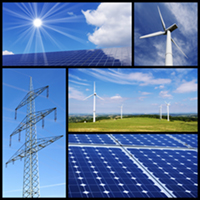Emission factors are coefficients that quantify the greenhouse gas (GHG) emissions or removals...
New Study on How to Finance Sustainable Economic Growth in Asia

Innovative Public-Private Partnerships Critical To Achieving Low-Carbon Growth
MANILA, April 4, 2013 – According to a new study funded by the United States Agency for International Development (USAID) on financing for green growth in 11 Asian developing countries, USD 90 billion per year will be required over coming decades for these countries to transition to sustainable, low-carbon economies. However, there are only USD 1.6 billion in approved investments in low-carbon projects and programs in the 11 countries, including Bangladesh, Cambodia, India, Indonesia, Laos, Malaysia, Nepal, Papua New Guinea, the Philippines, Thailand, and Vietnam. As a result, Asian governments are actively seeking innovative ways of mobilizing private sector finance to meet the funding shortfall, the authors conclude.
“Climate change poses perhaps the most urgent challenge of our time. As we try to find solutions to mitigate climate change and devise strategies to adapt to its impacts, we are brought to realize that each solution requires financial support” says Bindu Lohani, Vice President for Knowledge Management and Sustainable Development at the Asian Development Bank (ADB).
The report, Fast Out of the Gate: How Developing Asian Countries Can Prepare to Access International Green Growth Financing, reviews more than 200 public and private sector funds and mechanisms for financing projects, businesses, and infrastructure in the Asia region that mitigate emissions of greenhouse gases and thereby address climate change. The study aims to help Asian policymakers, public and private fund managers, banks, and even local communities identify ways to fund low-carbon development.
“Many of Asia’s developing countries are aggressively working to transition towards low emission, climate resilient growth,” says USAID’s Orestes Anastasia, Co-chair of the Asia Low Emission Development Strategies (LEDS) Partnership.“While this helps address several environmental challenges, it also significantly enhances industrial competitiveness and productivity, improves energy security, and increases long-term development and job creation.”
A key message from the report is that countries that are first to develop strong measurement, reporting, and verification frameworks for greenhouse gas emissions—a central requirement of public and private sector funds—will have the advantage in accessing climate finance.
On April 2-4, 2013 the ADB convened a meeting to discuss the results of the study at its headquarters in Manila, Philippines. Organized by the Asia LEDS Partnership and sponsored by the ADB, USAID, and the Climate and Development Knowledge Network (CDKN), the event convened Asian government officials and policymakers, fund managers, commercial bankers, project developers and others from the public and private sectors to learn about significant existing and emerging mechanisms to finance green growth, how Asian governments can access financing, and the important role of the private sector in funding green growth investments and climate change-related businesses.
For more information about the report and the meeting, please visit: http://lowemissionsasia.org/events/climate-finance-workshop-manila
###
About the Asia LEDS Partnership
The Asia LEDS Partnership is a voluntary, regional network of Asian governments, donors, and non-governmental organizations that promotes and supports low emission development across Asia through peer-to-peer learning, knowledge sharing, and improved coordination and cooperation among partners. For more information, visit: http://ledsgp.org/about/Asia_LEDS_Partnership
About the Asian Development Bank
The Asian Development Bank, based in Manila, is dedicated to reducing poverty in Asia and the Pacific through inclusive economic growth, environmentally sustainable growth and regional integration. Established in 1966, it is owned by 67 members — 48 from the region. In 2011, ADB approvals including co-financing totaled $21.7 billion.For more information, visit www.adb.org.
About the USAID Regional Development Mission for Asia
USAID is committed to helping developing countries pursue sustainable economic development and improve living standards worldwide. As the lead entity in the US Government for bilateral and regional assistance, USAID focuses on helping partner countries to establish the policy environments, improved governance, and financial incentives to set their economies on a low-emissions path of sustainable development and reduce vulnerability to climate impacts. For more information, visit: http://www.usaid.gov/
About the Climate and Development Knowledge Network
The Climate & Development Knowledge Network aims to help decision-makers in developing countries design and deliver climate compatible development. We do this by providing demand-led research and technical assistance, and channeling the best available knowledge on climate change and development to support policy processes at the country level. For more details, visit: http://cdkn.org/





